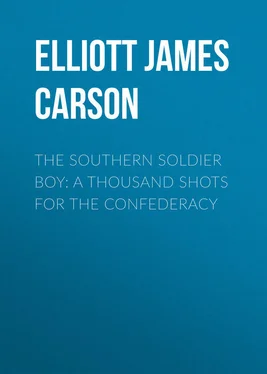James Elliott - The Southern Soldier Boy - A Thousand Shots for the Confederacy
Здесь есть возможность читать онлайн «James Elliott - The Southern Soldier Boy - A Thousand Shots for the Confederacy» — ознакомительный отрывок электронной книги совершенно бесплатно, а после прочтения отрывка купить полную версию. В некоторых случаях можно слушать аудио, скачать через торрент в формате fb2 и присутствует краткое содержание. Жанр: История, foreign_antique, foreign_prose, на английском языке. Описание произведения, (предисловие) а так же отзывы посетителей доступны на портале библиотеки ЛибКат.
- Название:The Southern Soldier Boy: A Thousand Shots for the Confederacy
- Автор:
- Жанр:
- Год:неизвестен
- ISBN:нет данных
- Рейтинг книги:3 / 5. Голосов: 1
-
Избранное:Добавить в избранное
- Отзывы:
-
Ваша оценка:
- 60
- 1
- 2
- 3
- 4
- 5
The Southern Soldier Boy: A Thousand Shots for the Confederacy: краткое содержание, описание и аннотация
Предлагаем к чтению аннотацию, описание, краткое содержание или предисловие (зависит от того, что написал сам автор книги «The Southern Soldier Boy: A Thousand Shots for the Confederacy»). Если вы не нашли необходимую информацию о книге — напишите в комментариях, мы постараемся отыскать её.
The Southern Soldier Boy: A Thousand Shots for the Confederacy — читать онлайн ознакомительный отрывок
Ниже представлен текст книги, разбитый по страницам. Система сохранения места последней прочитанной страницы, позволяет с удобством читать онлайн бесплатно книгу «The Southern Soldier Boy: A Thousand Shots for the Confederacy», без необходимости каждый раз заново искать на чём Вы остановились. Поставьте закладку, и сможете в любой момент перейти на страницу, на которой закончили чтение.
Интервал:
Закладка:
About the 1st of September, 1863, the Fifty-sixth Regiment, except Companys B and E, were detained to assist the Home Guards to arrest deserters and conscripts, and for five months operated in the counties of Randolph, Davidson, Moore, Montgomery, Chatham, Wilkes, Watauga, Ashe and Alleghany. During this time we arrested and sent two thousand men to the front that the militia were unable to manage, killing and wounding thirty-five in making these arrests. During the last two months of this service Company F furnished a provost guard of eighteen men, commanded by Sergeant F. M. Stockton, at regiment headquarters, Ashboro, N. C. About the 20th of January, 1864, the regiment gathered in camp at High Point, N. C., and drilled ten days, and then joined General Pickett’s command of six brigades – Hoke’s, Ransom’s and Clingman’s N. C. Brigades, Barton’s, Kemper’s and Corse’s Virginia Brigades. All met at Kinston, N. C., on the 30th of January, 1864, and made an expedition against New Bern, accompanied by a regiment of cavalry, First N. C., under Colonel Dearing, and several batteries of artillery. Set out 31st of January, and struck the enemy at Core Creek on Deep Gully at 3 a. m. on the first day of February, 1864. The Fifty-sixth was with Corse’s Brigade. Hoke’s Brigade made the attack on the fortified position, supported directly by Corse’s Brigade. Some of the forts and block houses were flanked, and the fighting was continuous until 9 a. m., when all positions were taken and the enemy in full flight for New Bern. We got all their camp equippage, five hundred prisoners, four pieces of artillery, commissary and quartermaster supplies, and pursued them ten miles to New Bern, invested the town, and skirmished around for thirty-six hours, then fell back. While on the skirmish line at 1 a. m., 2d February, we saw a Federal gunboat blown up. Our naval forces had gone down Neuse River in open boats and surprised and captured this vessel, and after taking the prisoners off, blew it up. The enemy were ready to evacuate as soon as we should make the assault, but from some misunderstanding of orders the attack was not made, and General Barton was afterwards court-martialed and acquitted.
We came back to Kinston and hanged twenty-five of those prisoners who were found to be deserters from our army. Then we went to Weldon and put up winter quarters where we had been in camp the summer before. About the 14th of February, a detail was made of twenty-five men from Company F and twenty-five men from Company K, under command of Captain Grigg and Lieutenant Shepherd, to help move the Federal prisoners from Richmond, Va., to Andersonville, Ga. We were on this service until 26th of March. These prisoners were in a pitiable plight and infected with small-pox. William Allen and Pink Pryor caught it from them; don’t see why we all did not. During this time or early in March the Brigade made an expedition against Suffolk, Va., and after a running fight with negro cavalry, took that town, but did not hold it long. Capt. Cicero Durham, in command of a skirmish line, drove all before him and charged into the cavalry line and single-handed cut down several men with his own hand. Gilbert Green, of Capt. Jud. Magness’ company, was killed in the town, fired upon by some negro troops from a house. The house was fired, and when the negroes jumped out they were shot down. Green was the only man we lost.
On the 14th of April, 1864, we were under light marching orders to leave our knapsacks and carry one blanket. The men were all in fine condition, and of Company F, one hundred answered roll-call and set out on the expedition for Plymouth, N. C., under Gen. R. F. Hoke. The forces consisted of Hoke’s and Ransom’s N. C. and Kemper’s Virginia brigades, First N. C. Cavalry Regiment, and several batteries of field artillery. We went by rail to Tarboro, and on the 15th set out for Plymouth, 65 miles distant, or three days’ marching. We arrived at Plymouth Sunday morning, 17th. The cavalry rushed forward and picked up first picket posts, followed by infantry. As they brought prisoners back, we noticed one horse shot in the nose, and a little further on a dead Yankee in the road.
General Hoke sent a truce flag and demanded the surrender of the post. General Wissils, in command, indignantly replied, “Take it.” General Hoke replied, “Remove all non-combatants within twenty-four hours.” We threw up earthworks that night. Next day sharp skirmishing took place until the twenty-four hours had expired, then a heavy skirmish line was thrown forward and all the enemy driven inside their defenses; then thirty pieces of artillery were brought into position and we began to shell the town. The enemy replied with great spirit, and a terrible duel raged from near sunset until 10 p. m. We were in front of our guns, lying flat, while the shot and shells from both sides hissed, whizzed and bursted over us. While we were engaged with the main fortifications, Hoke’s Brigade was taking a detached fort up the river by direct assault.
In addition to the land batteries, the gunboats in the river were hurling huge shells at us. The next day, Tuesday evening, Ransom’s Brigade worked its way around east of the town and, after a sharp skirmish fight, drove the Yankee pickets away from a deep creek, where we put in a pontoon bridge and crossed over and took position after dark under a picket and artillery fire. Here we formed for the final attack. The firing soon ceased, as we did not reply, and we lay in line of battle and got a good night’s sleep. At first dawn of day we were standing in line in the following order; Twenty-fifth on the right next to the river, Fifty-sixth next, Eighth (from Clingman’s Brigade, which was with us in place of Forty-ninth) in center, then Twenty-fourth and Thirty-fifth on the left, the field officers walking up and down the line quietly talking to the men. “North Carolina expects every man to do his duty. Pay close attention to orders, keep closed up, and press forward all the time. The sooner we can get into the town the better for us.”
Hoke’s and Kemper’s brigades were on the west side. They fired the signal guns, advanced their picket lines as if they were going to assault from that side, while we quietly moved forward and covered half the distance before the fire was opened upon us. Then began the shower of shot and shell. The two regiments on the right soon struck their cattle lot, and we had a drove of cattle in front of us, but coming to a lagoon and swamp we had to let the cattle pass back through our line. Then through water and slush four feet deep we made our way through the swamp and re-formed under cover of a little hill. The three regiments on our left passed around the swamp. We then raised a yell and rushed forward upon the intrenchments and were soon in possession of them, the Yankees falling back and taking shelter behind the buildings, kept up a steady fire upon us as we advanced rapidly. Our field artillery soon came in and opened fire, while the Twenty-fifth swept along the river and captured a fort, and the other regiments drove the balance of the enemy into the big Fort Williamson, on the south side of the fortifications. The Fifty-sixth split into three sections. Maj. John W. Graham advanced the center faster than the wings and soon planted our flag on the west fortifications. This was a signal for Hoke’s and Kemper’s brigades to come in from that side. On Monday night of the first attack, at midnight, our ironclad gunboat, Albemarle, came down the river and cleared it of all the Yankee shipping, sinking and running off all their gunboats. The Albemarle was firing into Fort Williamson. General Hoke demanded the surrender of this fort, but General Wessel was slow in giving answer. When General Hoke began to form his Brigade to assault it, the Stars and Stripes were hauled down and a white flag raised. After three hours of hard fighting, the town with entire garrison, consisting of two fine New York and two Pennsylvania infantry regiments, with cavalry and strong artillery force, and besides the killed and wounded, 2,800 prisoners. The post was strongly fortified and well supplied with military stores and much mercantile goods. As soon as the surrender was made, all our troops were turned loose to help themselves to anything they wished – grocery and dry goods stores richly stocked to select from. Being more than sixty miles from a railroad, and the enemy still close by at Roanoke Island and Washington, we could only supply immediate needs. We were marched out of town that evening.
Читать дальшеИнтервал:
Закладка:
Похожие книги на «The Southern Soldier Boy: A Thousand Shots for the Confederacy»
Представляем Вашему вниманию похожие книги на «The Southern Soldier Boy: A Thousand Shots for the Confederacy» списком для выбора. Мы отобрали схожую по названию и смыслу литературу в надежде предоставить читателям больше вариантов отыскать новые, интересные, ещё непрочитанные произведения.
Обсуждение, отзывы о книге «The Southern Soldier Boy: A Thousand Shots for the Confederacy» и просто собственные мнения читателей. Оставьте ваши комментарии, напишите, что Вы думаете о произведении, его смысле или главных героях. Укажите что конкретно понравилось, а что нет, и почему Вы так считаете.












